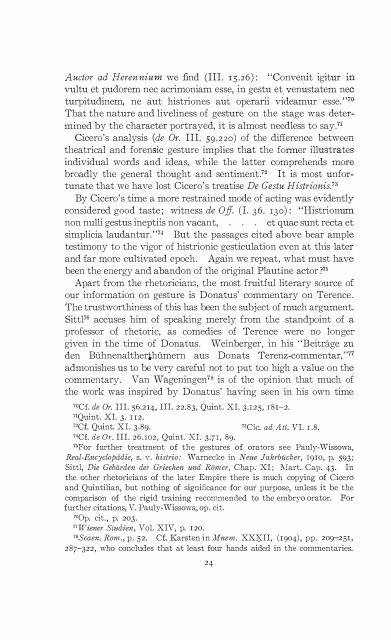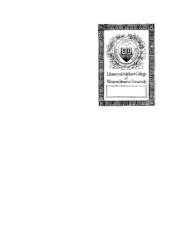Create successful ePaper yourself
Turn your PDF publications into a flip-book with our unique Google optimized e-Paper software.
Auctor ad Herennium we find (III. 15.26): "Convenit igitur in<br />
vultu et pudorem nec acrimoniam esse, in gestu et venustatem nee<br />
turpitudinem, ne aut histriones aut operarii videamur esse."7(}<br />
That the nature and liveliness of gesture on the stage was determined<br />
by the character portrayed, it is almost needless to say.71<br />
Cicero's analysis (de Or. III. 59.220) of the difference between<br />
theatrical and forensic gesture implies that the former illustrates.<br />
individual words and ideas, while the latter comprehends more<br />
broadly the general thought and sentiment.72 It is most unfortunate<br />
that we have lost Cicero's treatise De Gestu Histrionis.73<br />
By Cicero's time a more restrained mode of acting was evidently<br />
considered good taste ; witness de Off. (I. 36. 130) : "Histrionum<br />
non nulli gestus ineptiis non vacant, et quae sunt recta et<br />
simplicia laudantur."74 But the passages cited above bear ample<br />
testimony to the vigor of histrionic gesticulation even at this later<br />
and far more cultivated epoch. Again we repeat, what must have<br />
been the energy and abandon of the original Plautine actor ?75<br />
Apart from the rhetoricians, the most fruitful literary source of<br />
our information on gesture is Donatus' commentary on Terence.<br />
The trustworthiness of this has been the subject of much argument.<br />
SittF6 accuses him of speaking merely from the standpoint of a<br />
professor of rhetoric, as comedies of Terence were no longer<br />
given in the time of Donatus. Weinberger, in his "Beitrage zu<br />
den Buhnenaltherthumern aus Donats Terenz-commentar, "77<br />
admonishes us to be very careful not to put too high a value on the<br />
commentary. Van Wageningen78 is of the opinion that much of<br />
the work was inspired by Donatus' having seen in his own time<br />
70C£. de Or. III. 56.214, III. 22.83, Quint. XI. 3.125, 181-2.<br />
71Quint. XI. 3. II2.<br />
72Cf. Quint. XI. 3.89. 73Cic. ad At!. VI. 1.8.<br />
HC£. de Or. III. 26.102, Quint. XI. 3.71, 89.<br />
"For further treatment of the gestures of orators see Pauly-Wissowa,<br />
Real·Encyclopadie, s. v. histrio: Warnecke in Neue Jahrbiicher, 1910, p. 593 ;<br />
Sittl, Die Gebarden der Griechen und Romer, Chap. XI ; Mart. Cap. 43. In<br />
the other rhetoricians of the later Empire there is much copying of Cicero<br />
and Quintilian, but nothing of significance for our purpose, unless it be the<br />
comparison of the rigid training recommended to the embryo orator. For<br />
further citations, V. Pauly.Wissowa, op. cit.<br />
760p. cit., p. 203.<br />
77 Wiener Studien, Vol. XIV, p. 120.<br />
78Scaen. Rom., p. 52. Cf. Karsten in Mnem. XXXII, (1904) , pp. 209-251,<br />
287-322, who concludes that at least four hands aided in the commentaries.<br />
24
















